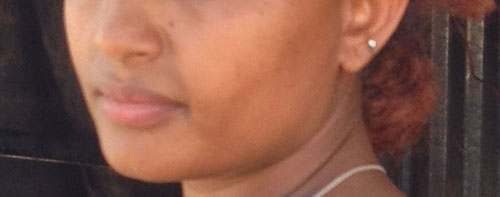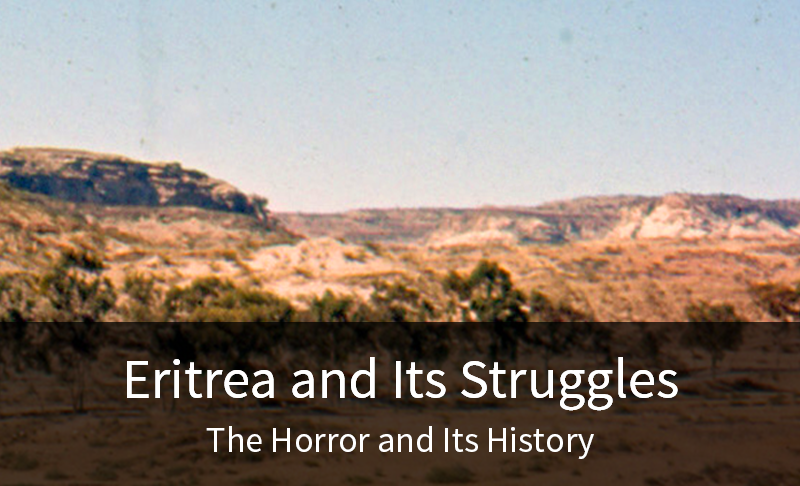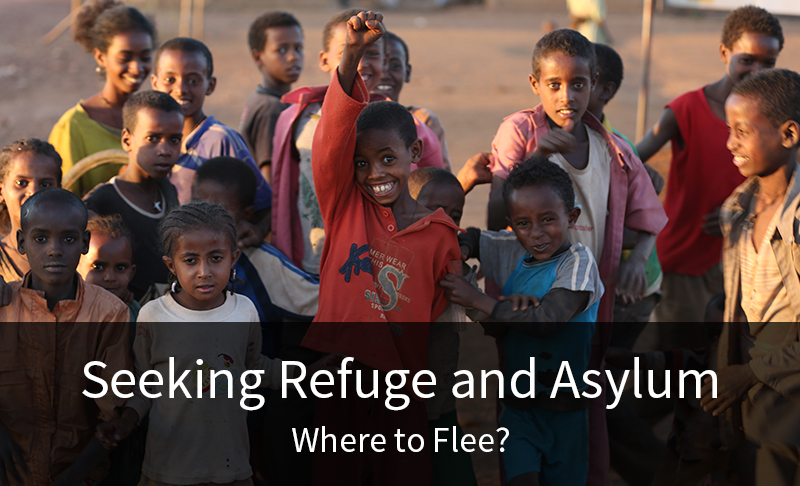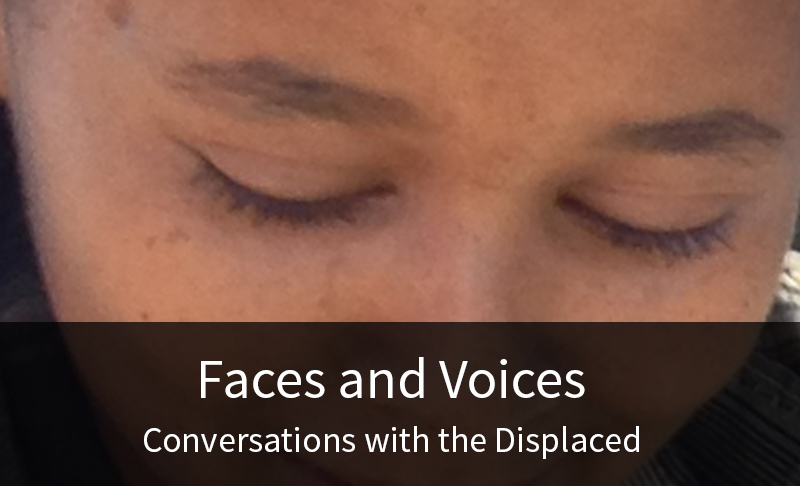Faces and Voices – In Israel
Faces and Voices – In Israel
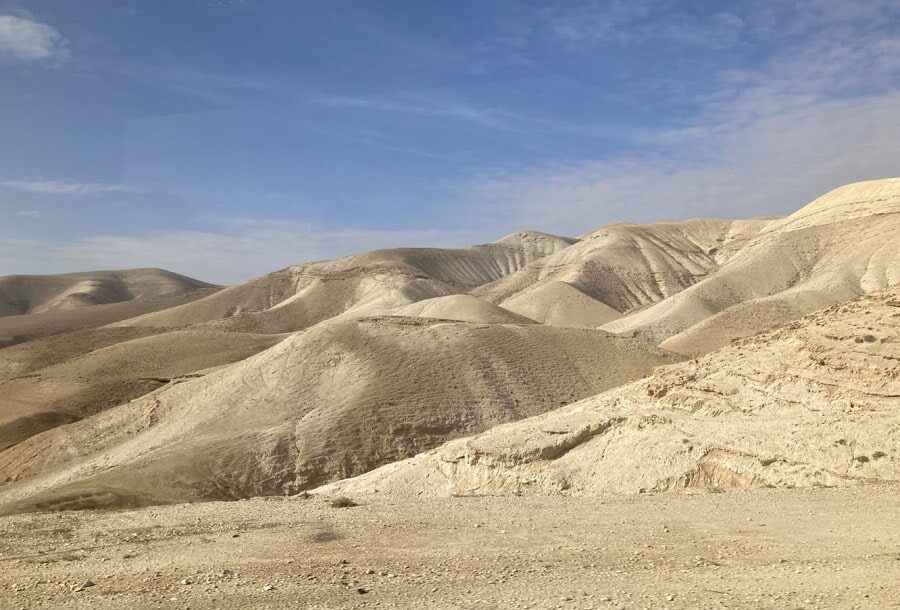
Eritrean refugees living in Israel subsist on a rough and extraordinary fault line.
Between 2006 and 2012, Eritreans fled their country for Israel in significant numbers. Along the way – in Sudan, in Egypt’s Sinai Desert, or both – they often endured unspeakable suffering, as traffickers sold them to rogue tribespeople who tortured them in seeking to extort money from their families. Many died when they couldn’t pay, or couldn’t endure. The passage was desperate. The atrocities went on and on. At last, Israeli authorities constructed a fence at the Sinai border, effectively stopping the flow.
From the peak years of that migration and beyond, life for Eritreans in Israel (as well as for other sub-Saharan Africans) has been marked by two discordant features. On the one hand, Israel has proven to be an utterly safe place of refuge, providing at least basic opportunities for physical security, food, shelter and medical care – indeed the only venue in the region willing and able to ensure all of that for Eritrean refugees. Just as crucially, Israel will not deport the refugees to Eritrea, where they would likely face a horrendous fate. On the other hand, the Israeli government has waged a continuing campaign to press the refugees, especially single men, to quit the country.
The former feature is a blessing. The latter is not: official refugee or asylee status is rarely granted to Eritreans, social services for them are scant, the refugees subsist in often over-crowded apartments, they’re barred from many professions (including those requiring licenses), university educations are prohibitively expensive, heavy taxes are imposed on their generally meager wages, most are prohibited from holding driver’s licenses, countless other legal and practical inconveniences abound, xenophobic demagoguery can appear in political discourse, and the government has pointedly and sometimes menacingly encouraged emigration to unwelcoming African countries. For several years, many Eritrean refugees were routinely placed in detention centers for having committed no crime other than having entered Israel from Sinai.
Various explanations might be offered for that set of contradictions – see, for example, our page titled “Surviving in Israel.” To begin, Jewish Israel itself is largely a nation of refugees, other immigrants and their recent descendants. They have come from all over the world. That collective identity can be seen in the mix of physiognomies on a crowded street in Tel Aviv, and it figures frequently in conversation. Israel has also been a democracy, with many human rights principles deeply ingrained in its conscience, and with high degrees of personal freedoms taken for granted in daily life.  Accusations of racial intolerance relative to immigration laws must be leavened by the government’s having robustly and repeatedly (if incompletely and sometimes controversially) airlifted tens of thousands of Black Ethiopian Jews into the country, resettled them there, and granted them citizenship. Accusations of religious intolerance must be leavened by the country’s absorption of over 300,000 Christians and Muslims from the former Soviet Union (provided they had had at least some Jewish ancestry). While the country’s relations with some neighboring Arab populations remain tense, violence-prone, and the subject of continuing and reciprocal human rights accusations, Israel’s own substantial Arab minority enjoys most privileges of citizenship, and it is represented in Parliament, the judiciary and the military officers’ corps. And so on, with complexity. But at bottom, Israel’s government and much of its citizenry have feared that embracing the current presence of non-Jewish, sub-Saharan African refugees would open the floodgates for millions more of the same to arrive, in a country whose population is something less than nine million. At least to an extent, then, the Eritrean dilemma involves a harsh and poignant collision between principle and geography.
Accusations of racial intolerance relative to immigration laws must be leavened by the government’s having robustly and repeatedly (if incompletely and sometimes controversially) airlifted tens of thousands of Black Ethiopian Jews into the country, resettled them there, and granted them citizenship. Accusations of religious intolerance must be leavened by the country’s absorption of over 300,000 Christians and Muslims from the former Soviet Union (provided they had had at least some Jewish ancestry). While the country’s relations with some neighboring Arab populations remain tense, violence-prone, and the subject of continuing and reciprocal human rights accusations, Israel’s own substantial Arab minority enjoys most privileges of citizenship, and it is represented in Parliament, the judiciary and the military officers’ corps. And so on, with complexity. But at bottom, Israel’s government and much of its citizenry have feared that embracing the current presence of non-Jewish, sub-Saharan African refugees would open the floodgates for millions more of the same to arrive, in a country whose population is something less than nine million. At least to an extent, then, the Eritrean dilemma involves a harsh and poignant collision between principle and geography.
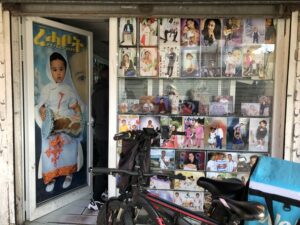
By December 2022, when a member of The America Team visited Tel Aviv, almost half of the original 34,000 Eritrean refugees in Israel had been effectively forced out of the country, or had otherwise managed to find for themselves more agreeable countries in which to make their homes.  Only a few had been formally accepted for resettlement in Western countries. Of those who remained, some had advanced beyond their initial, menial employment opportunities to operate small retail businesses in South Tel Aviv, the Eritrean population hub. Some wished to stay in Israel forever. More yearned to restart their lives in Canada or other Western countries, where the welcome would be less ambivalent, but where refugee slots were limited. For many Israelis, no immediate and likely policy solutions had appeared. But for our visitor, several pertinent and promising phenomena did come into view, as follows.
Only a few had been formally accepted for resettlement in Western countries. Of those who remained, some had advanced beyond their initial, menial employment opportunities to operate small retail businesses in South Tel Aviv, the Eritrean population hub. Some wished to stay in Israel forever. More yearned to restart their lives in Canada or other Western countries, where the welcome would be less ambivalent, but where refugee slots were limited. For many Israelis, no immediate and likely policy solutions had appeared. But for our visitor, several pertinent and promising phenomena did come into view, as follows.
First, during daylight hours in South Tel Aviv, our visitor saw few Eritreans on the streets. 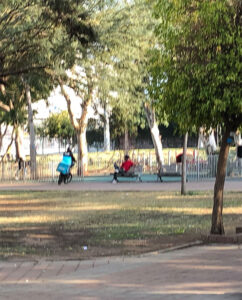 Reportedly they were all working, despite having had to learn a new language and to overcome other considerable impediments, both legal and cultural. They apparently are viewed generally as industrious workers, and they reportedly are sought after by many employers.
Reportedly they were all working, despite having had to learn a new language and to overcome other considerable impediments, both legal and cultural. They apparently are viewed generally as industrious workers, and they reportedly are sought after by many employers.
Second, in a series of anecdotal interviews with five refugees – two parents, plus three schoolgirls in their late teens (none of them from the same family) – our visitor heard consistently that young Eritreans were acculturating quite well. Specifically, at least some Eritrean children were excelling in their studies; their teachers nurtured them warmly and effectively; devoted Israeli volunteers helped them in after-school activities; the children felt at home among their refugee peers, but they also felt “Israeli”; they spoke generally flawless Hebrew, and good to excellent English as well; they were able to participate in and enjoy Israeli holiday celebrations; they deeply valued their uniquely Israeli educations; while growing up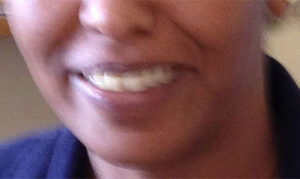 in Israel they had developed positive self-images and ideals; and they looked forward to meaningful careers (to the extent available, whether in Israel or elsewhere). An Israeli refugee advocate said that none of this was actually surprising – that Israel has long been the “world champion” in refugee absorption, owing to the Law of Return that allows Jews from any country to migrate there, and to the government’s concerted in-gathering of the Jewish people since the nation’s beginning; that its educational institutions especially had developed exceptional capabilities in integrating within Israeli society children of widely varying languages, ethnicities and religions; and that Israelis overall were justly proud of all of that. As to the particular schoolgirls, parental encouragement and support seemed to have promoted self-confidence and achievement. There meanwhile seemed little doubt that the girls – inspired, composed and mature beyond their years – could become assets to Israeli society, given a chance.
in Israel they had developed positive self-images and ideals; and they looked forward to meaningful careers (to the extent available, whether in Israel or elsewhere). An Israeli refugee advocate said that none of this was actually surprising – that Israel has long been the “world champion” in refugee absorption, owing to the Law of Return that allows Jews from any country to migrate there, and to the government’s concerted in-gathering of the Jewish people since the nation’s beginning; that its educational institutions especially had developed exceptional capabilities in integrating within Israeli society children of widely varying languages, ethnicities and religions; and that Israelis overall were justly proud of all of that. As to the particular schoolgirls, parental encouragement and support seemed to have promoted self-confidence and achievement. There meanwhile seemed little doubt that the girls – inspired, composed and mature beyond their years – could become assets to Israeli society, given a chance.
Third, our visitor came to understand that although many Israelis might wish the Eritreans to disappear, they treat them respectfully on the streets of the city. A decade ago, that had not necessarily been the case. With an exception cited by an interviewed schoolgirl – that an Israeli had spat on her because she was wearing a Coptic cross 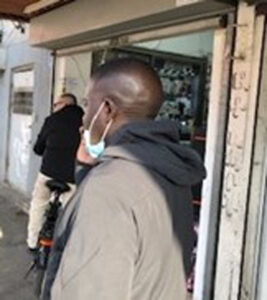 pendant – the refugees today reportedly aren’t bullied, taunted or mocked, however conspicuous they might be. That insight – if accurate – would appear to stand in sharp contrast to the experiences of many immigrants and other minorities the world over, including (at some times, and in some places) in the United States. That is to say, there appears in Israel to be a bedrock human dignity which at least this group of the officially unwelcome – and at least at this time – are instinctively accorded.
pendant – the refugees today reportedly aren’t bullied, taunted or mocked, however conspicuous they might be. That insight – if accurate – would appear to stand in sharp contrast to the experiences of many immigrants and other minorities the world over, including (at some times, and in some places) in the United States. That is to say, there appears in Israel to be a bedrock human dignity which at least this group of the officially unwelcome – and at least at this time – are instinctively accorded.
Fourth, in the aggregate, while many of those Eritreans who had effectively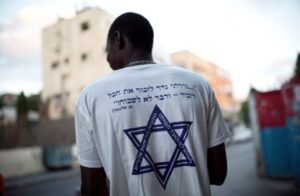 been expelled from Israel are known to have suffered as a consequence in other lands, the condition of those who remain seems to have marginally improved since the darkest days in Israel beginning a decade ago. More educational, health care and social services are available to them; small businesses have sprung up; refugees are no longer detained; and, as noted above, there is greater “acceptance” of the refugees in the streets.
been expelled from Israel are known to have suffered as a consequence in other lands, the condition of those who remain seems to have marginally improved since the darkest days in Israel beginning a decade ago. More educational, health care and social services are available to them; small businesses have sprung up; refugees are no longer detained; and, as noted above, there is greater “acceptance” of the refugees in the streets.
That quartet of observations brought the visitor to this thought: that within Israel – amid all its intensity, its contradictions, its struggles and its warts – there exists a fundamental capacity to transcend the visceral human impulse for exclusion in favor of a reasoned and humane outcome for the Eritrean refugees there. Thus, for example, a 2018 United Nations proposal for the UN to resettle half of Israel’s Africans in the West and for Israel to accord at least temporary humanitarian status (if not permanent refugee status) to the rest cries out for consideration.
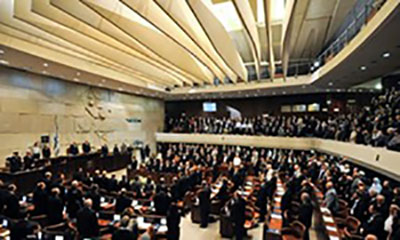
Getty Images — The Knesset
But with all of that said, another factor has lately emerged. The election of a new Israeli coalition government in November 2022 – just a month before the visit that’s the subject of this profile – stood to potentially affect the fortunes of the Eritrean refugee population. The new government has been widely described as the most far-right in the country’s history. It is seen as inclined to effect greater religious control over secular policies, greater political control over the court system, greater Israeli police control over the occupied West Bank, greater strength for the Israeli settler movement there, and greater tensions all around between Jewish Israelis, on the one hand, and Palestinians and Arab Israelis on the other. A reactionary worldview could spill over into immigration matters as well. Indeed, the coalition’s internal agreement calls for rolling back judicial protections for African migrants relative to detention, expulsion and wage confiscation. But conversely – and this is pure speculation – such a worldview could inflame enough other crises in Israel that the Eritreans there could be left alone. Of course, the new governing coalition could also fall in the next election. In any event, the prognosis for Eritrean refugees in this area has plainly darkened, but is unknown.
In some of these respects, Israel is not so unique. A country’s sense of its peoplehood has a way of defining itself, whether others like the resulting definition or not. But in other respects, there seemed here to be something distinctive. From prehistoric to Biblical through 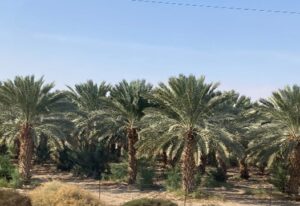 Assyrian, Greek, Roman, Arab, Crusader, Turkish, British and finally modern times, the land of Israel – planted by God or by fate at the narrow, fraught and vulnerable junction of three continents – has seen a virtually incessant procession of migration, conquest, insurrection, hegemony, expulsion, absorption and acculturation. As the country’s storied archaeological record attests, nothing here has been static for very long, nothing ever hermetic. Rather, as though for eons, everything both visible and invisible has been formed and re-formed, again and again, along what could be visualized as a pair of intersecting axes: horizontally (so to speak), by inputs from the world’s far-flung contemporary currents – social, technological, economic, political, religious; and vertically, upon the many-layered foundations of historical and archaeological succession – their glories and agonies, what’s been forgotten and what can never be. It did seem to a passing traveler, at the present intersection of those axes, that while Israeli society remains seized with existential questions about its very survival – and its survival as a democracy – the fate of its Eritrean refugees is one of the lesser items on its collective agenda. But it also seemed that there could be a place for some number of Eritrean refugees living in Israel to remain, to thrive, to contribute, and to be at relative peace in the land — and to be able to call it their home.
Assyrian, Greek, Roman, Arab, Crusader, Turkish, British and finally modern times, the land of Israel – planted by God or by fate at the narrow, fraught and vulnerable junction of three continents – has seen a virtually incessant procession of migration, conquest, insurrection, hegemony, expulsion, absorption and acculturation. As the country’s storied archaeological record attests, nothing here has been static for very long, nothing ever hermetic. Rather, as though for eons, everything both visible and invisible has been formed and re-formed, again and again, along what could be visualized as a pair of intersecting axes: horizontally (so to speak), by inputs from the world’s far-flung contemporary currents – social, technological, economic, political, religious; and vertically, upon the many-layered foundations of historical and archaeological succession – their glories and agonies, what’s been forgotten and what can never be. It did seem to a passing traveler, at the present intersection of those axes, that while Israeli society remains seized with existential questions about its very survival – and its survival as a democracy – the fate of its Eritrean refugees is one of the lesser items on its collective agenda. But it also seemed that there could be a place for some number of Eritrean refugees living in Israel to remain, to thrive, to contribute, and to be at relative peace in the land — and to be able to call it their home.
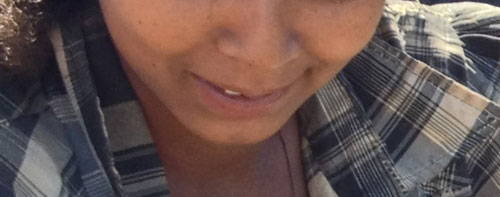
Among the schoolgirls:
“My dream is to be a nurse.” [Currently impossible for an Eritrean in Israel.]
“My dream is to be a doctor.” [Currently impossible for an Eritrean in Israel.]
“My dream is to be an electrician.” [Currently impossible for an Eritrean in Israel.]
“Wherever I end up living, I’ll say that I studied in Israel. I’ll always be proud of that.”
“I will never forget Israel, because this is where I learned about myself, and what it means to be a person.”
“I feel very Israeli, because I have so much freedom here – especially as a woman. I can do anything that a man can do.”
“My difficult travel from Eritrea through Eastern Sudan and Sinai is an important part of my life story. It makes me different from most Israelis. It helps define who I am.” [At a young age, the speaker had experienced and witnessed atrocities during the course of her journey to Israel.]
Among all the interviewees:
“All of humanity has problems. Humanity shouldn’t change. Overcoming problems makes you strong.”
“There are two types of people in the world: those who are good, and those who believe that to help themselves they must hate others. It will always be this way.”
“There are good and bad people everywhere. If you’re patient, your troubles will pass.”
“If I must leave Israel, wherever I go, I now know that there will be people who will be similar to me in their hearts, even if they’re not Eritrean.”

